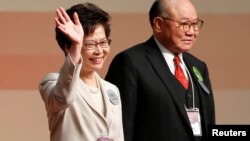Hong Kong has selected Carrie Lam to be the city's first-ever female chief executive, sealing an election that many saw as a foregone conclusion and not a democratic race.
Lam previously served as Hong Kong's chief secretary for administration and was China’s preferred candidate in the race.
While she lagged behind in public opinion polls, she outperformed her two male rivals — former finance secretary John Tsang and retired judge Woo Kwok-hing — claiming 777 votes. That is about 70 percent of nearly 1,200 votes cast by the city’s electoral committee, a body that is stacked with Beijing loyalists.
In her victory speech, she looked to put the focus back on Hong Kong, which she called "our home," and away from China's looming presence, pledging to build a better society by uniting its citizens and easing their frustrations.
Pro-democracy activists in this former British colony, however, have refused to acknowledge Lam’s victory in the election, given that the city's 7 million citizens were not allowed to participate in the election and because Lam was chosen from a “small-circle” of Hong Kong's pro-Beijing elite.
They have also vowed to boycott her future rule if she bows to the will of Beijing and puts China's interests ahead of the city’s.
First female leader
After being elected the city’s first female leader, Lam - accompanied by her husband, son and supporters - told a news conference that she understands Hong Kongers have suffered from serious divisiveness and accumulated lots of frustrations.
She pledged to begin a new chapter by easing the minds of her people, including those of her opponents.
“My priority will be to heal the divide and to ease these frustrations and to unite our society to move forward,” Lam said.
The chief executive-elect also said she would do her utmost to uphold both Hong Kong's "core values" and the "one country, two systems" model.
"Values such as inclusiveness, freedom of the press and of speech, respect for human rights and systems which have taken generations to establish such as the independent judiciary, rule of law and clean government are matters that we Hong Kong people find precious and are proud of," she said.
Protestor scuffles
While the votes were being cast, there were a number of rallies staged outside the voting venue either in support of Lam or in opposition of what protesters said was a rigged election.
There were also some scuffles between pro-democracy protestors and the police.
The anti-Lam protesters denounced Beijing’s “interference” amid widespread reports of lobbying of the votes to back Lam, rather than the more popular and conciliatory reformer Tsang.
They demanded a free election by universal suffrage.
Leading one of the protesting parades, pan-democrat legislator Nathan Law called for greater democracy, which he said he hopes will allow the city’s 7 million residents to have a say in the choice of their top leader.
As an electoral committee member, Law said he cast a blank ballot in Sunday’s vote, which he described as a “selection” rather than an election.
"The Beijing government has the final say on who is going to be appointed by the Beijing government. That is the reason why I cast a blank vote. Because as long as it is a very closed system, a selection, you should not add legitimacy to the system," Law told reporters.
No confidence
At another pro-democracy rally, Takchi Tam, the vice president of People Power — a progressive democratic party in Hong Kong — pledged to soon organize a protest outside China's representative office in Hong Kong to express the party's disagreement with what it argues is the communist rulers’ meddling in the election.
Tam said that most Hong Kong citizens have no confidence in Lam and her ability to balance the interests of the public and the rulers in Beijing.
“I don’t think she will keep the balance. I think she will betray Hong Kong people and sell Hong Kong people, sell Hong Kong people’s land, sell Hong Kong people’s benefits to the Chinese communist government,” Tam told VOA.
Tam expressed worries that, under Lam’s rule, the ‘one country, two systems’ formula enacted by China will soon be turned into ‘one country, one system.’
Continued stability
Lam’s supporters, however, disagreed.
Ivan Tsim threw his support behind Lam, who he said will lead the city into a better future with continued stability and economic prosperity, especially when the new leader has addressed his two major policy concerns.
“I’m more concerned [about] the education and housing, these are two big issues for Hong Kongnese,” Ivan Tsim told VOA.
Lam has promised a $644 million (HK$5 billion) budget for education, and to put greater efforts into increasing land and housing supplies as well as diversifying the city’s economic development.
Defeat for public opinions
Although Lam’s victory came as no surprise, some fear the electoral results have meant a defeat for the city’s public opinions and future democratization.
Others said it also meant Beijing would never loosen its grip on Hong Kong.
“Politically, as long as [Chinese president] Xi Jinping, the real hardliner, continues to govern China, he will continue to tighten his grip on Hong Kong and stop Hong Kong from democratizing,” Dixon Sing, associate professor of the Hong Kong University of Science and Technology's social science division, told VOA.







